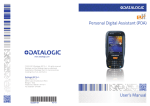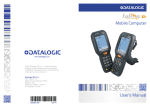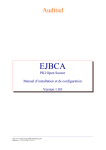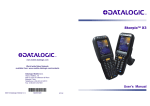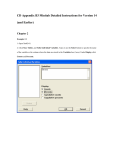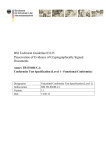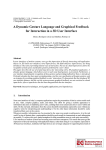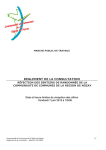Download ADSS Server Release Notes
Transcript
ADSS Server Release Notes This document provides a high-level description of the new features offered in each release of ADSS Server. Only the main features in each release are identified. ADSS Server v4.8.6 September 2015 ADSS Key Manager now supports the latest Microsoft Azure Key Vault APIs. ADSS Go>Sign Service now supports local signing using IntoIT middleware to support Belgian eID smartcards without using a local Java runtime. ADSS Go>Sign Service now supports mobile signing using AET Mobile ConsentID. The Manage CAs module now supports direct calls to GlobalSign's online Certificate Service. ADSS Server can now request certificates from a remote ADSS CA Server using a secure client/server TLS/SSL channel. ADSS Server v4.8.5.5 September 2015 Resolved an RA Service issue related to approving Device Certificates by Security Officer. ADSS Server v4.8.5.4 September 2015 Resolved an issue in OCSP Service while adding responder certificate in the OCSP response. ADSS Server v4.8.5.3 August 2015 Resolved an issue in HMAC recompute utility. ADSS Server v4.8.5.2 August 2015 Resolved an issue in Import/Export functionality. Resolved an issue related to headless installation in load-balanced mode. ADSS Server v4.8.5 July 2015 ADSS Server now supports Distributed OCSP and complies with the RFC 2560 and RFC 6960 standards in this area. A new separately licensed ADSS Server OCSP Repeater Service is now available which works with a separate full ADSS Server OCSP Service to provide precomputed OCSP responses for local OCSP clients - this is valuable where local OCSP clients do not want to always rely on central but remote OCSP servers and/or where speed of response is vital such as in PACS/LACS (physical or logical access control systems). The Manage CAs module has been enhanced to support direct communication with the following external CAs: (a) Windows Server 2008 and 2012 CA (b) QuoVadis CA This is in addition to the current support for ADSS CA Server, GlobalSign CA and PrimeKey CA (EJBCA). The Signing Service has been enhanced to allow API calls to override the value for the “Signed By” field in a visible signature. Memory and database connections statistics can now be examined by clicking “System Health” in the Server Manager module and new operator alert messages can be configured for these items within the Global Settings > System Alerts page. Manual renewal of infrastructure certificates is now possible in Key Manager. An existing profile / or certificate template can be used as a base when creating a new profile or template for selected services. ADSS Server v4.8.4.5 June 2015 Resolved an issue related to HTTP Headers in OCSP Service. ADSS Server v4.8.4.4 © Ascertia Limited June 2015 Commercial-in-Confidence Page 1 of 20 ADSS Server Release Notes Resolved an issue related to KEK generation in Thales HSM. ADSS Server v4.8.4.3 June 2015 Resolved an issue related to publishing of large CRLs. Go>Sign Service has been enhanced based on the ETSI plug-test findings. ADSS Server v4.8.4.2 May 2015 Resolved an issue related to HSM connectivity on Linux OS. Resolved an issue related to deleting TAs from Trust Manager. ADSS Server v4.8.4.1 May 2015 Resolved an issue related to database connectivity. ADSS Server v4.8.4 April 2015 ADSS Server has been enhanced to utilise Java 8 (JDK 1.8.0u31) and Apache Tomcat 8 (8.0.20). The Key Manager module has been enhanced: (c) To support Microsoft Azure Key Vault using the software or HSM based keystore (d) To allow automatic renewal of infrastructure certificates to be enabled or disabled The JVM maximum memory parameters for the ADSS Core, Console and Service Windows services or UNIX daemons are now configurable via the installation wizard. The Manage CAs module has been enhanced to view and save the CRLs for local CAs and send alerts when automatic CRL publishing fails. The ADSS Signing Service has been enhanced to ensure that PDF document conversion and signing is PDF/A-1, PDF/A-2 and PDF/A-3 compliant and to also support centrally created signature location profiles. The ADSS Go>Sign Service has been enhanced to sign multiple fields assigned to the current user in one go. ADSS Server Console has been enhanced to manage and repair HMAC verification failures if these arise in the Transactions Log of any service; Microsoft SQL Server 2014 and PostgreSQL 9.4 have been added to the list of supported databases. ADSS Server v4.8.3 February 2015 The HSM key wrapping functionality has been enhanced to ensure that SSCD Type 2 (CWA 14169 PP) compliant signatures are produced. The ADSS Signing Service has been enhanced to allow the signing profile to define the PDF signature dictionary size - this enables operators to create profiles that allow larger (or smaller) signature data sizes to be successfully embedded in the PDF. The ADSS Verification Service has been enhanced to provide detailed information for PAdES Part 2 and PAdES Part 4 signatures. The Manage CAs module has been enhanced to be able to use EJBCA and GlobalSign CAs as online external Certificate Service Providers. ADSS Go>Sign Service has been enhanced: (e) To ensure that PDF document conversion is PDF/A-1, PDF/A-2 and PDF/A-3 compliant; (f) To create empty signature fields at predefined locations; (g) To allow Go>Sign Applet to reload in single page application without reloading the page. ADSS Go>Sign Viewer can now display and sign Microsoft Word 2013 and Word 365 documents. Configurations in the ADSS Server properties files have been moved to be within the Admin Console under Global Settings > Advanced Settings to ensure the settings are preserved during upgrade. ADSS Server v4.8.2.2 January 2014 Resolved an issue related to email alerts when sent using SMTPS (i.e. SMTP over TLS/SSL). © Ascertia Limited Commercial-in-Confidence Page 2 of 20 ADSS Server Release Notes ADSS Server v4.8.2.1 December 2014 ADSS Server Manage CAs now allows user key and certificate containers to be imported and used with document signing requests. The ADSS Go>Sign Service now allows ADSS Go>Sign Applet to be used in a web page with or without calling "OnPageLoad". An ADSS Certification Service issue seen when HolderEntityName contains "UniformResourceIdentifier" or "OtherName" elements in Attribute Certificates has been resolved. ADSS Server v4.8.2 November 2014 ADSS Signing and Verification Services have been enhanced to create and verify Microsoft Office 2013 and Office 365 signatures. The ADSS Certification Service has been enhanced to: (a) Support Certificate Transparency extensions within TLS/SSL server certificates compliant with RFC 6962. (b) Enable certificate issuance requests to be prevented if CA certificate constraints are violated. The ADSS Verification Service now supports embedding attribute certificates within digital signatures as part of verification and enhancement. Local Certificate Authorities and Attribute Authorities support the publishing of their issued certificates on a defined LDAP server. When exporting ADSS Server configuration data all dependent configurations are now automatically included. ADSS Server v4.8.1 September 2014 ADSS Server can now be scheduled to restart at a selected future time, typically a quiet time such as 02:00 so that any configuration changes and the subsequent restart do not affect processing during business hours. The ADSS SCVP Service has been enhanced to dynamically discover the chain for an OCSP Responder certificate when using advanced discovery settings. The ADSS Certification Service has been enhanced to allow certificate validity periods to be defined in units of minutes, hours, days, months and years to better support short life certificates. The ADSS Manage CAs module has a new licensed Attribute Authority option. This can issue and revoke attribute certificates for existing identity certificates. Various Attribute Certificate profiles can be defined and a Registration Authority can request attribute certificates through the web services interface. ADSS Server v4.8 August 2014 ADSS Server currently supports keys held permanently within an HSM. A new feature allows keys to be exported under an HSM held and managed Key Encrypting Key (KEK) and held securely within the ADSS Server database where HSMs allow this functionality. This means that large numbers of users can now be enrolled within ADSS Server and have their own unique keys and certificates. The ADSS Certification Service now integrates with Active Directory to create user keys & certificates. ADSS Signing service and ADSS Verification Service have been enhanced: (c) Stand-alone PDF document timestamps can be created and verified. (d) XAdES v1.4.1 is now supported ADSS SCVP Service now supports validation fall-back options using CDP and AIA based addresses. The Key Manager module has been enhanced to support Windows CAPI/CNG software or CAPI/CNG based HSMs. The Manage CAs module has been enhanced to allow the CRL publishing period to be set independently of the CRL expiry date to allow over-issuance. In addition all issued certificates can have their expiry dates limited to the issuer CA certificate expiry. ADSS Server Console has been enhanced: (a) All load balanced ADSS Server systems are shown on the Admin screen home page. © Ascertia Limited Commercial-in-Confidence Page 3 of 20 ADSS Server Release Notes (b) To simplify manual OCSP routing configuration management multiple CA certificates can be imported at once from a system folder entered in the Service > Manual Routing page. This is valuable for large scale PKIs with routers that do not use the service locator extension. (c) To allow the ADSS Server hostname/IP address to be changed in the Server Manager module. This is valuable when the hostname/IP is changed after the ADSS Server installation. The configuration settings “Import” feature now enables an operator to choose to overwrite or skip configuration data that already exists in the target installation when importing saved configuration data. New operator alert messages are produced for the Core and Console services or daemons when in high availability mode and the “Slave” instance takes over from the “Master” instance. ADSS Server v4.7.7.3 June 2014 The Certification Service now supports the custom Subject Alternative Name extension within the SOAP XML protocol. ADSS CRL Monitor can now download the CRLs from a URL that contains a '+' sign. An issue in the Certification Service CMC protocol has been resolved. ADSS Server v4.7.7.2 May 2014 Resolved an issue handling special characters within certificate DNames. ADSS Server v4.7.7.1 May 2014 Resolved a licensing issue affecting XML signatures in the ADSS Verification Service. ADSS Server v4.7.7 May 2014 ADSS Signing Service and ADSS Go>Sign Service now feature a new HTML based “Signature Appearance” designer. The ADSS Verification Service now shows signature enhancement failures in the Transactions Log Viewer. The ADSS TSA Service has been enhanced to optionally use time obtained directly from the NTP servers configured in the NTP Time Monitor. ADSS Server Core instance now uses a high availability architecture on load-balanced systems. The default view on the ADSS CRL Monitor > CRL Details page now shows just those CAs whose Validation Policy is ‘Local CRL Cache’ or where automated polling is enabled for the CA. New system wide alerts are provided in the Global Settings > System Alerts page to alert operators about issues in database connections, certificate expiry and configuration change events. The Trust Manager module has been enhanced such that: (a) The OCSP Request Signing certificate is now configurable from the Validation Policy tab, previously it was on Back-end Certificates tab. (b) Trust Manager only shows the options related to the licensed services. ADSS Go>Sign Service has been enhanced to: (a) Support signed attributes in AdES signatures. (b) Support EPES signatures. (c) Use a hand signature image and/or company logo image provided by the business application. A new test case has been added to the PKCS#11 test utility to check the support for internal clock in the HSM. A new Trace Logs Utility is added which collects the product trace logs and appropriate ADSS Server information in a zip file. This assists in gathering the log information in one operation and will speed up the customer support process. ADSS Server Admin Console has been enhanced in these ways: (a) In Key Manager a hardware crypto profile can now be set as Active/Inactive. (b) In Global Settings Import/Export of Operators and Roles is now supported. (c) You can now search the Transactions Log Viewer using the Log ID value in each service. © Ascertia Limited Commercial-in-Confidence Page 4 of 20 ADSS Server Release Notes (d) The Verification Service > Signature Settings tab only shows the licensed signature types. (e) Management reports now default to show the last month’s data. (f) In OCSP Monitor and CRL Monitor an event count threshold is now available to not send alerts until the defined threshold is reached. (g) An on-screen alert has been added to identity certificates that have expired or are about to expire. Database drivers for all supported databases have been upgraded to the latest available versions. SQL Server driver (JTDS) stays at v1.2.2. Hibernate has been upgraded to the latest available version (v4.3.1). Database connection pool management has been enhanced. (a) ADSS Server now supports these databases versions: PostgreSQL 9.3; Oracle 12C; MySQL 5.6 ADSS Server v4.7.6.1 February 2014 Resolved an ADSS OCSP Service issue related to NextUpdate value in the OCSP responses when real-time certificate status database is used. ADSS Server v4.7.6 January 2014 ADSS Verification Service has been enhanced to support: (a) The OASIS DSS item “TimeStampContent” in the “VerificationReport” element of the response; (b) For historical validation, the CRL issued immediately before signing and the next CRL (after signing) are checked to see if the certificate was identified as revoked before the signing time. The ADSS Signing Service has a new HTML based PDF editor that is used to define blank signature field locations and manage signature appearances. ADSS LTANS Service enhanced to support: (a) A new optional HTTP protocol that delivers substantially better performance; (b) A new “renew” evidence request is supported via the HTTP interface - this is needed when ADSS Server only retains the original ERS and allows the original data to be sent once again to enable a new hash algorithm to be used within the LTANS profile. Log Archive management has been enhanced to: (a) Write all archived logs in zipped format to save the disk space; (b) Archived logs are now imported using a fast bulk-processing mode for better performance. ADSS OCSP Service has been enhanced to: (a) Allow smaller transactions logs to be created by deselecting certain transaction viewer columns, thus reducing the database overhead for heavily used systems; (b) A separate flag now identifies records processed using full certificate white list checking; (c) Non-issued certificate requests can now be searched for within the transactions log viewer; (d) OCSP responses can be set to “unknown” or “unauthorized” as required for certificates not issued by defined Trust Anchors; (e) OCSP response nextUpdate fields can now be set to contain a value even when using real-time whitelist data to meet RFC 5019 section 4 requirements; (f) HTTP header attributes have been implemented to meet RFC 5019 section 5 requirements that enable client OCSP caching. ADSS Go>Sign Service has been enhanced to: (a) Support local bulk document signing; (b) Go>Sign Profiles can now define multiple certificate issuers within the certificate filter criteria; (c) Browser cache management has been improved for Go>Sign Viewer/Applet; (d) Detect and report if the Java plugin is missing or not enabled on MAC OSX. ADSS Server now supports CRL and OCSP response caching for CAs registered in Trust Manager using CDP and AIA options (this was already supported for non-registered CAs). The term PAdES-A has been retired and is now referred to as a PDF Document Timestamping. ADSS Server now uses SHA-256 as the default hash algorithm when creating PKCS#10 requests. ADSS Server Access Control now allows Operators to be deleted in addition to being set as inactive. The ADSS Server sample data has been updated. © Ascertia Limited Commercial-in-Confidence Page 5 of 20 ADSS Server Release Notes ADSS Server v4.7.5.1 October 2013 An issue within HMAC verification related to DB connection pool exhaustion has been fixed. PAdES Part 4 LTV signatures have been enhanced to improve industry interoperability ADSS Go>Sign Service / Go>Sign Applet has been enhanced to add the extra manifest attributes required to support recent JRE 7 updates. ADSS Client Manager has been enhanced to fix a number profile management issues ADSS Server v4.7.5 October 2013 ADSS Server has been enhanced to utilise Java 7 update 25 and Apache Tomcat 7.0.42 ADSS Verification Service has been enhanced to optionally use the current CRL for historical validation when it contains historic data. ADSS CRL Monitor has been enhanced to confirm that: (a) The CRL data has been expanded successfully in the ADSS Server database and (b) Optionally generate an alert when the CRL number of the downloaded CRL does not have the next sequential number from the previous CRL. ADSS SCVP Service has been enhanced: (a) Smart Card Logon and Any Purpose bits are now shown in the Extended Key Usage list. (b) If multiple EKUs are provided in the profile then the target certificate must contain all these EKUs. (c) The list of validated OIDs is shown in the transaction logs. ADSS Server v4.7.4.6 August 2013 Resolved an issue in the ADSS Verification Service handling certificates with UTF-8 encoding in the subject DN. Fixed an issue with handling special characters when using username and password to authenticate to external TSAs. ADSS Server v4.7.4.5 August 2013 ADSS Signing Service now supports Universal Business Language (UBL) signatures. The ADSS Server setup script has been enhanced for headless mode operation. Issues related to: (a) empty signature field creation, (b) SCVP Service for policy mapping, and (c) OCSP relayed requests have been fixed. ADSS Server v4.7.4.4 August 2013 ADSS LTANS Service performance has been enhanced for LIST_IDs service requests. ADSS Server v4.7.4.2 July 2013 Resolved a Trust Manager issue related to updating the registered trusted authorities. ADSS Server v4.7.4.1 July 2013 The ADSS Certification Service has been enhanced to these ways: (d) Added option to include multiple distribution points in the issued certificate’s CDP extension; (e) All issued CRLs will now contain AKI extension; (f) Added option to include AIA extension in the issued CRLs. ADSS Server v4.7.4 July 2013 ADSS OCSP Service has been enhanced to enable compliance with RFC 6960 whitelist checking. The ADSS Certification Service and ADSS RA Service protocols have been enhanced to add SAN extensions rfc822Name and dNSName in addition to allowing this within Key Manager. © Ascertia Limited Commercial-in-Confidence Page 6 of 20 ADSS Server Release Notes ADSS Server now supports username/password based authentication to external TSAs. The ADSS Verification Service has been tuned for better performance and an issue fixed when upgrading an XAdES signature to a long-term format if it is created using a SHA-2 hash. The ADSS LTANS Service has been modified such that when the hash algorithm is changed within a profile only the ERS archives that have their Archive Data stored locally will be automatically refreshed. ADSS Server v4.7.3 June 2013 The ADSS Go>Sign Service has been enhanced in these ways: (g) Documents and data are now hashed within the Go>Sign Service to optimise performance and security, Go>Sign Applet now creates PKCS#1 signatures so that the signature format can be finalised on the server and extended to timestamp or long-term format as required. (h) Business applications can now send just the hash of XML or text file for XML/XAdES or PKCS#7/CMS/CAdES signatures to be signed by Go>Sign Applet. (i) NSS key stores are now supported. (j) Real time PIN handling for PKCS#11 devices is supported using errors returned by the device. The Go>Sign Document Viewer has been enhanced in these ways: (a) Document Viewer settings now have a new profile tab called “Viewer Settings”. (b) Document conversion now uses licensed technology from Apose instead of OpenOffice. (c) Automatic generation of field name can be enforced by profile settings. (d) A top bar shows the overall status of the signatures in the open document. (e) A nice certificate viewer has been added to show the detail of signer certificates. (f) WACOM and Signotec tablets now show a rectangle to maintain the signature image aspect ratio. The ADSS Verification Service has been enhanced such that each verification profile can define the policy for allowed hash algorithms, key algorithms and key lengths. ADSS Server HMAC verification process has been improved to separately identify missing HMAC values in the HMAC verification report instead of reporting such records as HMAC verification error ADSS Server v4.7.2 April 2013 The Manage CAs module has been enhanced to configure the ADSS Server as an external CA. The ADSS Signing Service now supports certificate revocation checking for BES signatures. The ADSS Server admin console has been enhanced to help the administrator/operator when the database is not available. The ADSS Go>Sign Service has been enhanced to: (a) Embed the certificate chain when creating a local signature; (b) Draw empty signature fields with same aspect ratio as the signature appearances and create hand signature images with the same aspect ratio as the signature appearances; (c) Improve localisation by adding new language options for different info, error and warning messages; (d) Provide a dialog box that displays the hand signature image drawn on the tablet device; (e) When signing a document with a profile that requests a certifying PDF signature, any subsequent signature operation will ignore the ‘certify’ request since this can only be applied once; (f) Reason, Location and Contact info can be marked as mandatory; (g) The Go>Sign transaction log contains entries for each individual action taken in the Document Viewer; (h) Certificate revocation checking is performed for BES signatures; (i) Go>Sign profiles can now control the use of the “draw, text and upload” tabs for hand signature images within the document viewer. The Go>Sign Document Viewer has been enhanced to: (a) Provide support for PDF form fields; (b) Provide a cancel button to cancel the signing operation; (c) Resolve issues related to page scrolling and message dialog displacements; © Ascertia Limited Commercial-in-Confidence Page 7 of 20 ADSS Server Release Notes (d) Optionally show tooltips on the Open and Finish buttons to guide new users; (e) Improve the information display on the signature verification dialog; (f) Move a new signature field by attaching it as the mouse pointer and then dropping it on the document when the mouse is clicked; (g) Provide feedback to a business applications so it can perform new operations based on the user action, e.g. reload the web-page using a different Go>Sign profile; (h) Enforce the signing of fields in incremental way based on the field name and number; (i) A new interface can show error messages in any language that is provided. ADSS Server v4.7.1.10 April 2013 Resolved an ADSS Go>Sign Service issue when signing with PKCS#11 tokens. ADSS Server v4.7.1.9 April 2013 Resolved an issue with user sessions across multiple load-balanced ADSS Go>Sign Service instances. ADSS Server v4.7.1.8 April 2013 Resolved an issue with user sessions across multiple load-balanced ADSS Go>Sign Service instances. Resolved an issue when enhancing a basic signature to an advanced format in ADSS Verification Service. Resolved an issue with CRL polling status when using multiple load-balanced ADSS CRL Monitor Service instances. ADSS Server v4.7.1.7 March 2013 Improved support for user sessions across multiple load-balanced ADSS Go>Sign Service instances. Resolved an issue related to email alerts when sent using SMTPS (i.e. SMTP over TLS/SSL). Resolved an issue in OCSP Monitor related to daily test scenario execution. ADSS Server v4.7.1.6 March 2013 PKCS#11 support provided in the Go>Sign Service for Linux and MAC operating systems. ADSS Server v4.7.1.5 February 2013 A Go>Sign Service PKCS#11 PIN caching issue has been fixed. ADSS Server v4.7.1.4 February 2013 Resolved Go>Sign Service issues: (a) when handling multiple signatures within the same session (b) avoiding an additional upload when the document source is set to server ADSS Server v4.7.1.3 February 2013 Resolved a Go>Sign Service signature appearance issue. ADSS Server v4.7.1.2 February 2013 Homepage alerts will now be supressed for inactive profiles, operators and certificates to avoid unnecessary messages. Resolved an issue in Verification Service related to use of the configured grace period when operating in HTTP mode. Go>Sign Service has been improved: (a) To support space characters and custom defined values in the Certificate Alias display pattern; © Ascertia Limited Commercial-in-Confidence Page 8 of 20 ADSS Server Release Notes (b) To prevent signing using older v1 UAE EID cards which do not contain hand-signature images; (c) Signing dialog has been enhanced to show the remaining number of retries for the PKCS#11 device PIN. ADSS Server v4.7.1.1 January 2013 ADSS Go>Sign Service has been enhanced to support: (a) User sessions across all load balanced instances; (b) Business applications can now dynamically set certificate filter criteria; (c) Application requests that contain just the document/data hash for signature; (d) Server-side signing using the document viewer - a signing passphrase dialog is now available; (e) Resolved an issue relating to Icelandic characters support in the Go>Sign Document Viewer. Key Manager HMAC key generation has been enhanced to offer additional key sizes ADSS Go>Sign Applet has been enhanced to work with the UAE eID cards ADSS Server v4.7.1 January 2013 ADSS Server Certification and RA Services have been enhanced to support the CAB Forum EV SSL requirements. An option is introduced in ADSS Certification Service profile to reject the request if requested Subject DN does not match the Subject DN pattern configured in certification profile. ADSS Certification Service has been enhanced to handle the Names Constraint in Subject DN. ADSS Server certificate templates now supports the Acrobat Authentic Documents Extended Key Usage (EKU) option. ADSS Certification Service profiles now allow the selection of the crypto profile for the keys and certificates created. ADSS Go>Sign Service has been enhanced to provide tight integration with UAE eID card features ADSS Server v4.7 December 2012 A new ADSS RA Service is now available as a licensed option. This service manages certification and revocation requests from end-users, applications, servers and SCEP protocol devices. ADSS Go>Sign Service and ADSS Go>Sign Applet have been enhanced to support local key generation and CSR handling for the ADSS RA Service. ADSS Server v4.6.1.5 November 2012 Resolved an issue related to Certificate Viewer within ADSS Server Console. ADSS Server v4.6.1.4 November 2012 The ADSS Go>Sign Service has been enhanced by providing support for Wacom signature tablets on both Citrix and non-Citrix environments. An issue related to behaviour of “Cancel” button on signature tablet dialog has been resolved in the ADSS Go>Sign Service. Signature tablet disconnection handling in the ADSS Go>Sign Applet has been enhanced. ADSS Server v4.6.1.3 November 2012 The ADSS Go>Sign Applet now provides transaction status when Finish button is clicked. Implementation for “OK” and “Cancel” buttons on signature tablet dialog has been enhanced in the ADSS Go>Sign Applet. The ADSS Go>Sign Applet signing dialog has been enhanced – now it does not show hand signature options when the associated signature appearance profile does not include the hand signature. ADSS Server v4.6.1.1 © Ascertia Limited November 2012 Commercial-in-Confidence Page 9 of 20 ADSS Server Release Notes A few issues related to hand signature image in signature appearance have been resolved when using Signature tablet device. ADSS Server v4.6.1 October 2012 The ADSS Go>Sign Service has been enhanced by providing support for Signotec signature tablets on both Citrix and non-Citrix environments. An issue related to publishing of CRLs by local CA has been resolved in Manage CAs. ADSS Server v4.6.0.2 October 2012 An issue related to unnecessary increase in size of PDF documents upon signing has been resolved in ADSS Go>Sign Service. The ADSS Go>Sign Service has been improved to allow generating multiple signatures using a PKCS#11 device in a single session. The ADSS Go>Sign Service has been improved to resolve interoperability issues when accessing the Go>Sign demos in Firefox, Chrome and IE internet browsers. ADSS Server v4.6.0.1 October 2012 The ADSS Go>Sign Service has been improved to require business applications to request the signed document back from the ADSS Go>Sign Service. ADSS Server v4.6 September 2012 A new ADSS Go>Sign Service is now available as a licensed option. This service updates and enhances the way Go>Sign Applet works with business applications. The ADSS Go>Sign Service allows multiple profiles to be created to select and control the functionality of Go>Sign Applet. A new server component, ADSS Go>Sign Viewer provides powerful PDF display, navigate, and signing features. Multiple PKCS#11 drivers are now supported in the new Go>Sign Service. This allows Go>Sign Applet to work in environments where multiple smartcards/USB tokens are deployed and users need to be able to sign with the token type they have been given. A new OCSP Monitor Service is now available as a licensed option. It fully replaces the current OCSP Monitor desktop product and is valuable in monitoring the correct functioning of one or multiple OCSP servers/ OCSP responders. The CRL Monitor Service has been enhanced with an advanced reporting option and new reports and alerts are available. ADSS Server v4.5.7.3 September 2012 An issue related to verification of archive files stored on the file system in LTANS Service has been resolved. ADSS Server v4.5.7.2 August 2012 An issue related to Accuracy settings in TSA Service profiles has been resolved. ADSS Server v4.5.7.1 July 2012 An issue related to Turkish characters support has been resolved. An issue related to use of optimized HTTP protocol in Verification Service has been resolved. ADSS Server v4.5.7 July 2012 ADSS Verification Service manager now has a setting to define if the input signed data objects/documents are stored in the database. ADSS Server v4.5.6.2 © Ascertia Limited June 2012 Commercial-in-Confidence Page 10 of 20 ADSS Server Release Notes An issue related to editing Signing Service profiles has been resolved. Resolved a couple of issues related to CRL Monitoring Service debug logging. ADSS Server v4.5.6.1 June 2012 An issue related to LTANS archive validity has been resolved when the archive renewal time was set to a value above 68 years. An issue related to Signing Service has been resolved when signing documents using existing keys imported from an HSM. Database connection leakage issues have been resolved in ADSS Server Console and Service components. ADSS Server v4.5.6 May 2012 ADSS Verification Service profiles have been enhanced to allow one or more selected Time Stamping Authorities (TSAs) to be configured and used when enhancing a basic signature to include a timestamp. The ADSS Verification Service can now optionally use an optimised HTTP protocol to substantially improve performance over OASIS DSS web services, the selection is done using a protocol flag in the ADSS Client SDK. Email, SMS and SNMP alerts have been enhanced by introducing general alerts when the database or optional HSM(s) become disconnected or become available again. SHA-256 is now the default hashing algorithm when configuring ADSS Server services. ADSS Server v4.5.5.2 May 2012 An issue related to database connections has been resolved when processing large number of OCSP Service requests. ADSS Server v4.5.5.1 April 2012 Process has been enhanced to cache the latest CRL in memory for high speed OCSP responses. ADSS Server v4.5.5 April 2012 ADSS TSA Service now supports Microsoft Authenticode timestamp requests. ADSS Signing Service now supports PDF Permissions and can thus set copying, printing and commenting rights. The signature appearances designer has been enhanced to allow much greater control of signature appearances for new or existing signature fields. ADSS CRL Monitor has been enhanced to factor the CRL freshness policy into the calculation of when the CRL Next Update time has arrived. There is also a new option that allows just the latest CRL to be retained to improve database size management for one or multiple CAs with very large CRLs. The Transaction Log viewer has been enhanced. ADSS Trust Manager has been enhanced to enable a Time Stamp Authority to be associated with a particular CA so that local signatures can be extended using the appropriate TSA when using a common signature profile. The ADSS Console starts quicker than before with any alerts shown after the home page has loaded. ADSS Server v4.5.4.2 March 2012 Certificate path building has been enhanced in various ADSS services to support non-English characters in certificate subject name. ADSS Server v4.5.4.1 March 2012 Resolved an OCSP service issue related to loading CRLs in memory for high speed OCSP responses. © Ascertia Limited Commercial-in-Confidence Page 11 of 20 ADSS Server Release Notes ADSS Server v4.5.4 March 2012 ADSS CRL Monitor has been enhanced to allow all prior CRLs to be deleted and thus reset CRL information for a particular CA. ADSS CRL Monitor can now import revocation information from multiple partitioned CRLs stored in an LDAP repository as a feed for the OCSP service. ADSS LTANS Service has been enhanced such that (a) LTANS profiles now define the Signing and Verification authority addresses to be used and (b) greater control is offered over the inclusion of meta-items when computing the XMLERS and notary signatures and during subsequent storage. ADSS Signing and Verification services now support PDF collections. The ADSS Signing Service PDF signature appearances designer has been improved. Following a successful ETSI PAdES plug test a number of enhancements have been integrated. The Certification Service now supports the deletion of valid keys and certificates via the API. PostgreSQL 9.1 has been tested and added to the list of supported databases. Solaris 11 has been tested and added to the list of supported operating system. ADSS Server v4.5.3.3 February 2012 Resolved a CRL Monitoring issue related to CRL polling. ADSS Server v4.5.3.2 February 2012 Resolved an issue related to XML signature verification in ADSS Verification Service. ADSS Server installation wizard has been enhanced to resolve a problem with inserting sample data ADSS Server v4.5.3.1 January 2012 Path validation has been enhanced in XKMS, SCVP and Verification services to support dynamic path building using NIST LDAP repository. PKITS test cases pass when test data is imported manually and also when data is discovered dynamically from NIST LDAP repository. ADSS Server v4.5.3 January 2012 The ADSS Signing service higher speed HTTP interface has been enhanced to support signing attributes and PDF signature appearance profiles (these were already supported within the OASIS DSS interface). The OCSP service and Timestamp service response messages now support signing using the GOST algorithm. ADSS Server has been updated to use Java EE 6 release 29 (jdk1.6.0_29). ADSS Server v4.5.2.2 January 2012 An issue related to database connection pool management has been resolved. ADSS Server v4.5.2.1 November 2011 Handling of longer key aliases is enhanced for the keys imported from hardware crypto devices. ADSS Server v4.5.2 November 2011 To respond to the recent attacks on trusted CA services ADSS Server can be licensed to enable Trust Manager to mark a CA as revoked so that all signature and certificate validation requests receive revoked responses for any issued certificate. Also CRL Monitor now allows individual certificates to be marked as revoked to allow a fraudulent certificate that was not legitimately issued to be treated as revoked. The Certification Service has been enhanced to allow an option to set the “Valid From” date/time for a new certificate to be in the future. © Ascertia Limited Commercial-in-Confidence Page 12 of 20 ADSS Server Release Notes The OCSP Service has been updated to provide an option to check if a good target certificate (i.e. not identified within a CRL) was actually issued by the issuing CA (only if the ADSS Local CA was the certificate issuer). ADSS Server v4.5.1.3 February 2012 Path discovery has been enhanced in XKMS, SCVP and Verification services to avoid manually configuring additional LDAP repositories and CRLs for Trust Anchor certificates. ADSS Server v4.5.1.2 January 2012 Path validation has been enhanced in XKMS, SCVP and Verification services to support dynamic path building using NIST LDAP repository. PKITS test cases pass when test data is imported manually and also when data is discovered dynamically from NIST LDAP repository. ADSS Server v4.5.1 October 2011 The Verification Service has new options when checking a long-term signature that does not have an embedded timestamp: (a) the signature can be checked at the current time, or (b) an error can be returned. The Signing, Verification, XKMS, LTANS, Certification and Decryption Services now allow profiles to be referenced by Profile Name as well as by Profile Id. The OCSP Service has been updated to allow the OCSP response signature to include its certificate alone or the full certificate chain. The Signing Service now allows signature appearances to be overridden if this option is enabled. ADSS Server v4.5.0.2 October 2011 The HSM automatic reconnection feature has been enhanced. ADSS Server v4.5.0.1 October 2011 An issue related to database connection pool management has been resolved. Handling of revoked target certificates is enhanced in the ADSS XKMS Service. ADSS Server v4.5 August 2011 Support for the Russian GOST algorithm has been added. Support for reason based segmented CRLs has been added. Certificate validation has been enhanced within the SCVP, XKMS and Verification services to include: a) LDAP referrals are now supported in DPD (Delegated Path Discovery); b) Indirect CRLs support is enhanced to satisfy PKITS DPV and DPD test cases; c) Information on non-registered CAs and their CRLs found within DPD processing is now cached. ADSS Server v4.4.4.2 (Patch release) August 2011 An issue related to signing PDF on multiple pages has been resolved. ADSS Server v4.4.4.1 (Patch release) August 2011 HSM auto reconnection logic has been enhanced. ADSS Server v4.4.4 July 2011 The ADSS Signing Service can now use configuration settings to manually allocate and optimise the space for PDF signature dictionaries. The Certification Service and Manage CAs modules now support custom Subject Alternative Name and Issuer Alternative Name extensions and the Manage CAs module can now publish CRLs to an LDAP directory. © Ascertia Limited Commercial-in-Confidence Page 13 of 20 ADSS Server Release Notes The transaction logs viewer in the Verification, XKMS and SCVP service modules now provides full details of an expired CRL within the signer certificate chain. The ADSS Server console now automatically connects to multiple load balanced ADSS Server instances. ADSS Server v4.4.3 June 2011 The performance of ADSS Server Delegated Path Discovery (DPD) has been substantially increased and timeout values in seconds can now be set. ADSS SCVP Service now supports an easy to understand structured view of the SCVP request and response messages. Certificate distinguished name default configurations have been moved from Global Settings to the Key Manager module. A separate support utility has been added that can be used to verify the full functionality of a PKCS#11 HSM device during interop testing or fault finding. ADSS Server v4.4.2.1 (Patch release) June 2011 An ADSS Verification Service long term signature verification issue has been fixed as has a key quality issue when verifying PDF signatures. The ADSS Signing service has been enhanced by extending support for detached PAdES signatures according to ETSI TS 102 778 V1.1.1 (2009-07) PAdES profiles. ADSS Server v4.4.2 May 2011 ADSS Signing Service has been enhanced by: (a) Supporting “ISO 8601” date formats in PDF Signature appearance; (b) Extending support for special language characters; (c) Providing new settings, that can prevent a label with no value being shown for a PDF signature field when no value is supplied, e.g. (Reason: /Location: /Contact:). ADSS Signing and Verification services have been enhanced by providing support to generate and verify counter signatures. ADSS Verification Service has been enhanced by adding support for enhancing the PAdES signatures to part 3 and part 4. Added support for “CRL Entry Extensions” within OCSP response messages. SHA2 and RipeMD hashing algorithms are now supported ADSS CA Service CRL publishing. The ADSS TSA Service has been enhanced by: (a) Adding an allowed hash algorithm list; (b) Adding an option to reject a TSA request if it does not contain the 'certReq' flag. ADSS SCVP Service has been enhanced to support further RFC 5055 options, e.g. scvpServer and scvpClient EKUs are now supported in request / response signing certificates respectively. NTP time monitoring has been enhanced to generate an alert and stop ADSS Services when none of the configured NTP servers can be connected. Added support to generate certificates with multiple RDNs. ADSS Server v4.3.4 (Patch release) May 2011 An ADSS SCVP Service path verification issue with Self-Issued certificates has been fixed. An ADSS Verification Service long term signature verification issue has been fixed. Also resolved an XML verification issue when the signer is revoked. ADSS Server v4.3.3 (Patch release) April 2011 An ADSS SCVP Service FPKI path building issue has been fixed. An ADSS Verification Service long-term signature issue has been fixed. © Ascertia Limited Commercial-in-Confidence Page 14 of 20 ADSS Server Release Notes ADSS Server v4.3.2 (Patch release) April 2011 The ADSS TSA Service now supports a list of allowed algorithms. An ADSS Signing Service issue relating to the handling of images within signature appearance profiles has been fixed. An upgrade issue relating to the default HMAC key has been resolved. ADSS Server v4.3.1 (Patch release) March 2011 Resolved a trust chain issue affecting OCSP Service start-up. Resolved a location issue relating to blank signature field creation. Resolved an issue relating to email address parsing. ADSS Server v4.3 February 2011 ADSS Signing and Verification services have been enhanced by: (a) Providing support for PAdES signatures based on ETSI PAdES standard (TS 102 778); (b) Providing extended support for XAdES and CAdES specifications; (c) Supporting the creation of PDF signature fields using X/Y coordinates (OASIS DSS-X profile). ADSS Signing, Verification, XKMS, Certification and LTANS services have been extended to support SOAP v1.2. ADSS Verification and XKMS services have been enhanced to support enveloping XML signatures in request and response messages. The ADSS XKMS Service additionally supports detached XML signatures in request and response messages. ADSS Verification, SCVP and XKMS services have been extended to support PKITS compliant path discovery and path validation. The Verification and XKMS services have also been enhanced to extend support for detailed PEPPOL requirements. A new ADSS Verification Gateway Service has been introduced as a licensed option within ADSS Server. This new service replaces the original ADSS Gateway software. Managed service providers need such Verification Gateways to allow clients to protect their data privacy by extracting the document signatures and sending only these for external verification. The ADSS TSA Service has been enhanced to support ESSCertIDv2 Update for RFC 3161. A new time drift check facility allows ADSS Server to check that server system time is acceptably accurate by cross-checking with a list of trusted NTP servers. If predefined thresholds are exceeded then ADSS Server (a) warns operators about the unacceptable time drift and can then (b) stop all services. ADSS Server home screen alerts have been enhanced such that the hyperlink only shows those records which are relevant to the specific alert. Management reports have been added to the XKMS, SCVP and LTANS service modules which provide different levels of graphical and tabular reports on service usage in real-time. Reports can be exported in PDF format or as CSV files. The ADSS Server installation wizard now installs three different ADSS Server components, namely (a) the Core service, (b) the Console service and (c) selected Service modules. Each of these components uses a separate Java Virtual Machine to provide better resource management for high performance systems. Administrators can choose to install these components on just one single system or on separate physical or virtual machines. The ADSS Trust Manager module has been enhanced in these ways: (a) When deleting a CA, if the CA is used elsewhere then the references to it are shown so that an administrator can confirm or cancel the delete request; (b) Validation policy configurations can now allow the real-time downloading and caching of CRLs and use them to validate certificates issued by a registered CA – this is particularly relevant when checking certificates issued by Entrust CAs that feature partitioned CRLs; (c) When registering a new CA the Friendly Name offered uses CA certificate common name by default to save time and mistakes - the default value can be used or changed as required; © Ascertia Limited Commercial-in-Confidence Page 15 of 20 ADSS Server Release Notes (d) When adding CRL resource addresses for a CA, a certificate it has issued can be identified so that all the CDP addresses are automatically read and added to the CRL resource list - this saves operator time and prevents typing mistakes; (e) A hierarchal view of registered CA certificates is now provided that shows chained certificates in a tree structure. The old classic view is still available if required. When deleting a key within Key Manager, if the key is used anywhere within the ADSS Server, the references to it are shown so that an administrator can confirm or cancel the delete request. CRL Monitor now allows the administrator to manually update a CRL without first turning off CRL polling within Trust Manager – this saves operator time when configuring a system. Wild card search is now available in various ADSS Server modules. ADSS Server v4.2.9 (Patch release) February 2011 Resolved an issue relating to external Time Stamping Authorities with a space in their DName. ADSS Server v4.2.8 (Patch release) January 2011 Support for ECDSA has been added to meet FIPS201 requirements. HMAC computation has been enhanced to handle network HSM disconnections. ADSS Server v4.2.7 (Patch release) December 2010 The Key Manager HSM connection test has been enhanced. The System Log Viewer has been enhanced. It now shows a Log ID column in the Operational Logs and an issue with importing archived logs has been fixed. XAdES/CAdES plug test enhancements have been integrated. ADSS Server v4.2.6 (Patch release) November 2010 Key Manager key importing has been enhanced. ADSS Server v4.2.5 (Patch release) October 2010 Resolved a CRL Monitor issue associated with CRL 'certificateHold' entries that have no 'holdInstructionCode'. ADSS Server v4.2.4 (Patch release) October 2010 Resolved a CRL Monitor issue with handling delta CRLs. Resolved a Verification, XKMS and SCVP services PKIX validation issue. Improved the way Key Manager displays certificate templates and imports PFX/PKCS#12 files. ADSS Server v4.2.3 (Patch release) September 2010 The ADSS Verification Service has been extended to support an additional OASIS DSS VerifyInfo attribute “Id”. Resolved an issue with the loading of historic CRLs in ADSS Verification Service. ADSS Server v4.2.2 (Patch release) September 2010 Resolved an issue in Verification service profile handling. Resolved an issue with CRL Monitor email alerting when polling for multiple CRL addresses. Resolved an issue with headless installation on non-Windows platforms. ADSS Server v4.2.1 (Patch release) August 2010 The ADSS SCVP Service has been extended to meet the GSA FIPS 201 test case requirements. © Ascertia Limited Commercial-in-Confidence Page 16 of 20 ADSS Server Release Notes The PKIX implementation has been extended in the XKMS, SCVP and signature verification services to meet more of the PKITS test cases. ADSS Server v4.2 July 2010 The ADSS Signing Service now includes support for signed attributes in CAdES and XAdES signatures as an option during OASIS DSS signing operations. Signing profiles now allow a signature grace period to be configured which defines how long the ADSS Server should wait after the signing time (shown in the timestamp or otherwise the signer's local system time) before converting the basic signature to an advanced ETSI AdES signature. The ADSS Verification Service has been extended to support additional DSS-X verification reports, such as returning authenticated and unauthenticated attributes and the verification of the full chain for CRLs and OCSP responder certificates. In addition the Verification Service profiles have been extended to support signature grace periods. These define how long the ADSS Server should wait after the signing time (shown in the timestamp or otherwise the signer's local system time) before verifying a signature. PEPPOL optional inputs are now supported as is the configuration of a peer XKMS server to determine revocation information for certificates whose issuer is not locally trusted on ADSS Server. The ADSS XKMS Service has been extended to support PEPPOL extensions. XKMS Service profiles have been introduced to allow greater granularity of the configuration options in such areas as Trust Anchors and certificate validation options. The transaction logging has also been enhanced for better presentation of the certificate validation process information. The ADSS SCVP Service has been extended to support Delegated Path Validation (DPV) with optional validation policy attributes in the response & support for multiple certificates in a request. The ADSS Verification, XKMS and SCVP services now support these features: (a) PKIX algorithm based validation of the certificate chains; (b) Transaction logging has been enhanced to also store the validation profile configuration at the time of verification to allow a later audit review of the ADSS Server decisions. The ADSS OCSP Service has a new feature to allow high speed OCSP response processing by optionally not storing the OCSP transactions and caching the latest CRL in memory. The number of internal ADSS Server “local CAs” has been extended. A new ADSS Server “Manage CAs” module has been created to allow multiple Root and issuer CAs to be configured if required. Configuration for all local and external CAs has been moved to “Manage CAs”. A new alerting system has been introduced to display alerts on the ADSS Server home page for various events such as license expiry, certificate expiry (includes CAs, clients and end user certificates), unused service profiles and uncertified keys within the Key Manager. The ADSS Access Control module has been enhanced to allow greater control over operator roles. Each service module and its sub-modules can be controlled whether to allow Add, Delete, or Modify operations and enabling dual control is now possible at a sub-module level. All ADSS Server services can now be configured to retry connections with external OCSP, TSA and CRL addresses when there is a connection failure. The ADSS Server Global Settings module has been enhanced to support client authentication when communicating with a TSA Server running over SSL with client authentication. ADSS Server v4.1.4 (Patch release) June 2010 Resolved an issue with SNMP alerting to include ADSS Server IP address. ADSS Server v4.1.3 (Patch release) June 2010 Resolved an issue with handling Unicode characters within the signature appearance designer. Resolved an issue with repeated optional output elements within DSS verification response. ADSS Server v4.1.2 (Patch release) May 2010 Enhanced the proxy handler to support NTLM authentication. Enhanced the PDF signature appearance designer to allow signature labels to be modified. © Ascertia Limited Commercial-in-Confidence Page 17 of 20 ADSS Server Release Notes Resolved an issue with handling remote file paths within LTANS service request messages. ADSS Server v4.1.1 (Patch release) May 2010 Fixed an issue with handling Operator CA certificates that contain a quotation character. Fixed an issue related to terminating the ADSS Server process when stopping on UNIX platforms. Fixed an issue with creating signed and timestamped Verification Service response messages. ADSS Server v4.1 April 2010 The ADSS Signing Service has been extended to support the enhancement of basic signatures to more advanced ETSI AdES formats as an option during OASIS DSS signing operations. In addition signature appearance attributes are now supported in the signing request as defined in the OASIS DSS-X Visible Signatures profile. Signing profiles now allow even greater configuration flexibility including the option to select alternate signing keys/certificates – this is valuable when load balanced servers need to sign using a key/certificate held within their own local PCI HSM where cloning of HSM keys and certificates is not allowed by the trust scheme, e.g. Adobe CDS Certificates. The ADSS Verification Service has been extended to support the enhancement of basic signatures to more advanced ETSI AdES formats as an option during OASIS DSS verification operations. OASIS DSS-X Verification Reports are supported and PEPPOL trust ratings are now available to determine signature and certificate quality. The Verification Service profiles have been extended to allow greater granularity of the configuration options in such areas as Trust Anchors, signature formats and certificate validation options. CRLs can now be optionally retrieved in real-time from the CDP contained in the target certificate – useful for partial CRLs. Finally the transaction logging has been enhanced for better presentation of the signature verification and certificate validation process information. The ADSS TSA Services has been extended to support RipeMD160 and SHA 224 hash algorithms. A new option is provided to use the HSM internal time clock when generating timestamp tokens provided this is supported by the target hardware. The ADSS LTANS Service has been extended to include a range of new features such as: (a) supporting application supplied meta data attributes within the generated evidence record; (b) searching meta data attributes to select evidence records; (c) return XMLERS data back if requested within export transactions; (d) verify archived evidence records before they are returned in export transactions; (e) able to select whether to store the original data within the archive, file system or to post to a configured URL and allowing the option to only store the evidence record and not the data; (f) archive profiles can configure how to verify signed data objects before they are archived; (g) archive profiles can control the deletion policy for archived information; (h) Support is provided to read and write large data objects via network paths. A new ADSS SCVP Service is now available as a licensed option. This follows the recently ratified RFC 5055 Server-based Certificate Validation Protocol standard. Delegated Path Validation (DPV) has been implemented in this release. The ADSS OCSP Service has been enhanced to support real-time revocation information for the local ADSS Server CA and support additional hash algorithms. The ADSS CRL Monitor service has been enhanced to be able to optionally monitor and check all CRL resources for a defined CA. Alerts can be sent if any of the CRL resources are seen to have trust issues within them. Delta CRLs are now also supported. Within all ADSS Server services the transactions log viewer screens have been enhanced to allow operators to select which columns they wish to show on the screen. Extended character set certificates and CRLs can now be used within ADSS Server. SNMP (Simple Network Management Protocol) based alerts are also now available. ADSS Server v4.0.4 (Patch release) March 2010 Added msvcr71.dll redistributable to avoid ADSS Server Windows service startup problems. This avoids operators having to copy this DLL manually. ADSS Server v4.0.3 (Patch release) © Ascertia Limited Commercial-in-Confidence March 2010 Page 18 of 20 ADSS Server Release Notes PKCS#11 enhancements have been made to better handle existing keys and certificates. Certificate templates now use an updated country list. Oracle 11g has been added to the list of supported databases. The ADSS LTANS Service has been enhanced to better handle the evidence renewal process Fixed a bug relating to external Time stamping Authorities with a space in their DName. ADSS Server v4.0.2 (Patch release) February 2010 Enhanced the HMAC feature to work with a broader range of HSMs. Enhanced the policy controls for CRL based validation in the signature verification service. The Certification Service can now use the full PKCS#10 subject DN attributes. CRL handling within the Trust Manager and the CRL Monitor service has been enhanced. CRL Monitor now supports digest authentication when downloading CRLs for configured CAs. Stale connections to a MySQL database are now automatically recovered. ADSS Server v4.0.1 (Patch release) January 2010 The ADSS Server certificate viewer now supports Qualified Certificate statement extension details. Navigation on the ADSS Server Global Settings > Certificate Templates page has been enhanced. Indirect CRLs resources can now be successfully tested from within the ADSS Trust Manager when registering a CA. The optional sample test data that can be used at installation time has been enhanced. ADSS Server v4.0 November 2009 Added the following features as part of the CEN CWA 14167-1 (Security Requirements for Trustworthy Systems Managing Certificates for Electronic Signatures - Part 1: System Security Requirements) compliancy audit: (a) Check the expiry of certificate before use in any ADSS service (e.g. Signing, Verification, Certification, TSA, OCSP etc.); (b) Perform revocation checking for back-end SSL/TLS server authentication certificates, ADSS infrastructure certificates and back-end TSA certificates; (c) Ability to issue emergency CRLs at the time of receiving a revocation request within ADSS Certification Service; (d) Support for IETF CMC protocol for processing certificate generation and certificate revocation requests from CMC-compliant clients, e.g. RA systems like AET BlueX. CMC over SSL/TLS is also supported for client authentication; (e) Ability to terminate the SSL session upon log out or session timeout; in both the cases operator needs to re-launch the ADSS Server console in a new browser instance in order to re-login to ADSS Server; (f) Support the generation of the ADSS Server Tomcat SSL Server Authentication key inside PKCS#11 devices e.g. HSM; (g) Support the generation of system integrity checking HMAC keys in PKCS#11 devices e.g. HSM, Also included the ability to update the HMAC key; (h) Dual control facility is extended within Approval Manager to also cover generation/import of keys in Key Manager and import of configurations in the Global Settings module; (i) Provides a built-in certificate viewer capable of showing the certificate’s fingerprint and the related fingerprint algorithm; (j) Support for ETSI Qualified Certificate profile (TS 101 862) within the ADSS Certification Service module. A built-in certificate profile template is added for this purpose; (k) Ability for administrators to enable Tomcat’s SSL debug logging to record login failures attempts performed by ADSS operators. The Certification Service module now supports manual certification by importing an external PKCS#10/CSR (certificate signing request) and issue certificate against the imported PKCS#10. © Ascertia Limited Commercial-in-Confidence Page 19 of 20 ADSS Server Release Notes The Certification Service module now supports creation of new certificate templates in addition to the default ones. ADSS Server can now be installed in headless mode i.e. without a GUI-based wizard. This option is provided to help administrators to remotely install ADSS Server on non-Windows machines. © Ascertia Limited Commercial-in-Confidence Page 20 of 20




















